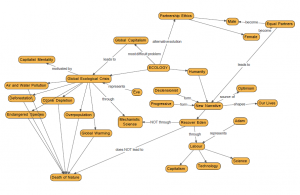click the image below for full size
In A Conversation with Carolyn Merchant Russell Schoch discusses Merchant’s interest in the environment and how her views on the recovery of nature have evolved. Schoch and Merchant also talk about what she feels all of humanity needs to do to alleviate what she calls the “global ecological crisis”.
Schoch introduces Carolyn Merchant and gives a brief description of her career. They begin their conversation by discussing how Merchant originally became interested in the environment, feminism and their history. She describes how she identifies with nature and how this identification has evolved over time.
Merchant views the earth as being in a “global ecological crisis” due to the capitalist mentality of our society. The ecological problems currently facing the earth; overpopulation, ozone depletion, global warming, endangered species, deforestation, air and water pollution etc. have been caused by society’s misuse and domination of the world’s resources driven by humanity’s need to “get ahead”.
According to Merchant an important component needed to overcome this “global ecological crisis” is to develop a new narrative. Her book “Reinventing Eden: Western Culture as a Recovery Narrative”, highlights the mainstream “progressive” narrative that has shaped western culture since the scientific revolution of the 17th century. Globally, humanity can recover the Garden of Eden state by using the labour forces in agriculture, science, technology and ultimately capitalism to redesign the whole earth into a garden. The declensionist narrative promoted by Merchant conceptualizes Eden as Earth before human intervention.
Merchant is optimistic that through a “partnership ethic”, in which people and nature are viewed as equally important, mutually beneficial situations will result from human and non-human communities living interdependently. She believes that what is required is a global ecological revolution, a process that will involve a shift in thinking about humanity’s place in nature and its responsibilities toward nature. It will be a long process but through such initiatives as organic agriculture, biodiversity treaties, green political parties and sustainable development we will eventually end up with a renewed world.
References:
Merchant, C. (2002). A conversation with Carolyn Merchant. California Monthly, 112(6).

